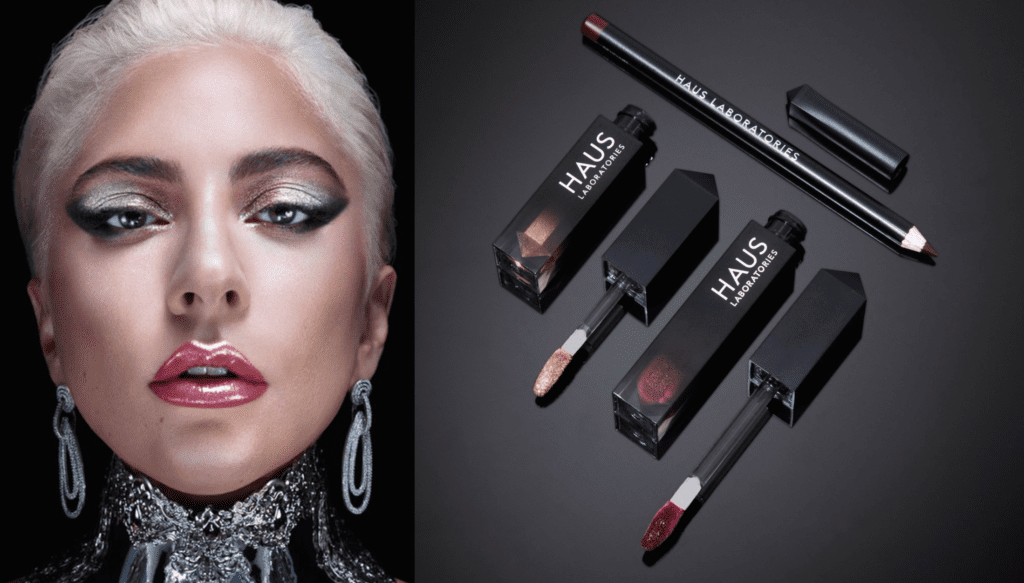On the heels of a hit film, an Oscar win, and a Las Vegas residency, Lady Gaga is branching out into beauty. More than a year after legal counsel for the singer quietly filed a trademark application for registration for Haus Beauty, 33-year old Lady Gaga – born Stefani Germanotta – has confirmed the launch of her budding beauty brand, which “starting in September will [offer up] kits combining lip gloss, lip liner and all-over color,” she told BoF on Tuesday.
Slated to become available to consumers in a direct-to-consumer capacity this fall by way of the already-live Haus Laboratories website, Lady Gaga has announced that she will also partner exclusively with Amazon to make the collection available “in nine countries on three continents, including the U.S., France and Germany, where customers can take advantage of Amazon’s” expedited shipping options, per BoF, making the beauty venture the first major beauty brand to launch exclusively on Amazon. Additionally, “Hundreds of millions of additional customers from Singapore to Brazil will be able to buy the brand through its global store.”
Gaga’s soon-to-launch brand will join Amazon’s larger push into the cosmetics market. The $1 trillion Seattle-based e-commerce titan clearly demonstrated its intent to break into beauty this spring when it launched Belei. The private label – which consists of 12-product range collection and was formulated based on the arsenal of search and purchase data that Amazon has collection based on the sales of third-party beauty and skincare brands on its platform – is Amazon’s first independent foray into nearly $500 global beauty industry.
With the help of the enormous star power of Lady Gaga and her wildly devoted following, Amazon is seemingly positioning itself to compete with the likes of Sephora, whose parent company inked a joint venture with Rihanna for her Fenty Beauty endeavor, and Ulta, the exclusive third-party retailer for Kylie Jenner’s burgeoning Kylie Cosmetics. Meanwhile, LVMH’s closet rival Kering is also investing in beauty as a source of increased revenue, particularly as the blockbuster revenue gains for its marquee Gucci brand start to normalize after sky-rocketing under the immediate watch of creative director Alessandro Michele.
As for why so many giants are banking on beauty, the high-margin beauty market is huge and growing. According to Zion Market Research, the $532 billion value of the global cosmetics and beauty products market is expected to reach a whopping $863 billion in 2024, making it what Nielsen calls one of the fastest-moving consumer goods sector in the world.
In terms of whether brands can make a splash in the increasingly crowded beauty market without a famous face at their forefront is another matter entirely. Celebrity-fronted beauty brands are hardly novel territory; Elizabeth Taylor was the first star to create her own fragrance back in 1987 and has spawned an entire industry of famous faces as beauty goods brands.
However, as of late, there have been a boom in celebrity beauty brands, and in many cases, these go beyond a single fragrance or one-off collaboration. Lady Gaga’s full-blown beauty venture joins the likes of Rihanna’s blockbuster Fenty Beauty, Kylie Jenner’s similarly very-successful eponymous cosmetics brand, Kim Kardashian’s KKW label, Gwyneth Paltrow’s Goop products, Jessica Alba’s Honest Beauty, and the growing number of others said to be in the works from stars, such as Selena Gomez, Hailey Bieber, Serena Williams, Millie Bobby Brown, and Ariana Grande.
With built-in bases of consumers by way of their fans, celebrities certainly have a well-established advantage over other new brands and in many cases, even established ones. In addition to the luxury of launching products to an already-established and often highly-engaged pool of consumers, celebrity founders have powerful marketing tools right in their pockets, free of charge.
“Celebrity endorsements through million-dollar [social media posts] have the ability to reach consumers faster than any traditional marketing campaign,” says Joseph Magnacca, CEO of cosmetics licensing giant Massage Envy, and thus, celebrities are vying to “leverage their status” in order to cash in on the lucrative beauty and skincare market.
Aside from the marketing cost efficiencies of a brand’s founder having millions of Instagram followers, and thus, removing the need to look (and spend) outside of the company for marketing, the power of having a direct line to consumers – which comes with social media – is not to be overlooked, either.
There is also a reliability factor. The all-powerful millennial and Gen-Z consumers “want someone they can relate to and celebrities they idolize fit that bill much more than a corporation,” according to Dazed Beauty. “Though celebrities aren’t exactly relatable—their lifestyles are aspirational and that’s what actually sells product— in the case of the Kardashian-Jenners, [consumers] seen their rise to stardom, we’ve grown up with them in our living rooms, we’ve contributed to their success and that counts for a lot.”
This emotional connection to certain celebs, paired with oftentimes legitimately good product that aims to fill a market void (Rihanna’s sweeping variety of foundation shades that seek to serve a more diverse audience than any other existing brand, for instance), does not necessarily bode well for traditional beauty brands. As Angela Irish, co-founder and president of OZNaturals, says, “Is competing with celebrity [beauty brands] a challenge for many companies? Absolutely.”











